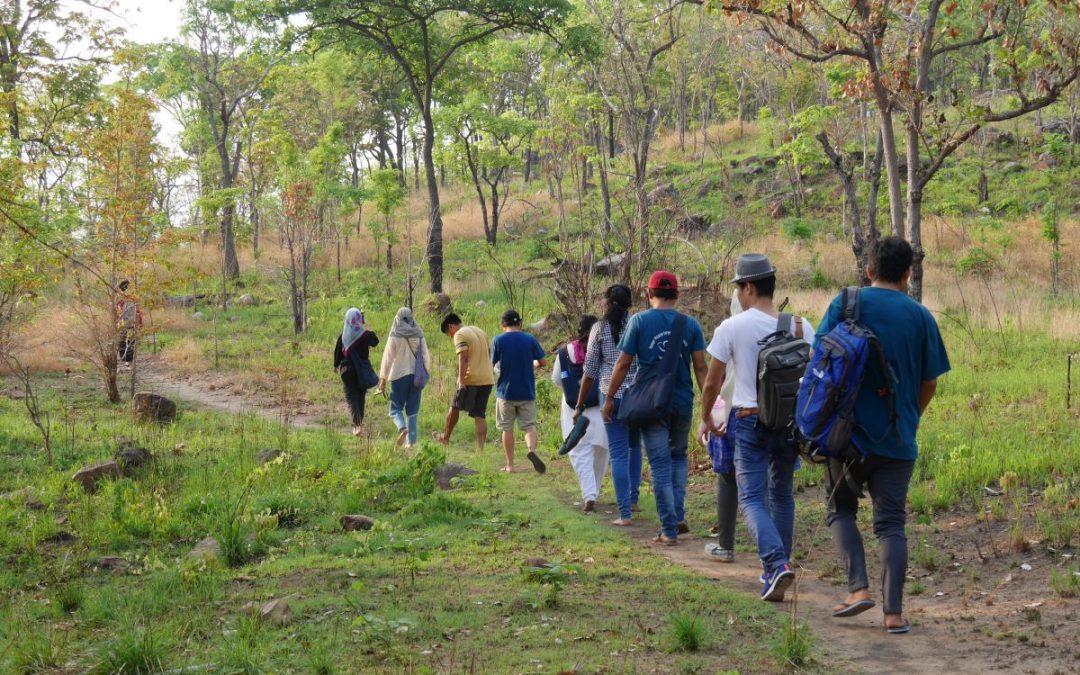
by topsi | Dec 1, 2019 | SENS
ประกาศทุนการเรียนภาษาอังกฤษสำหรับบุคคลทั่วไปและพระสงฆ์ หลักสูตรภาษาอังกฤษเพื่อการรับใช้สังคม (School of English for Engaged Social Service – SENS)
สถาบันการเรียนรู้เพื่อการเปลี่ยนแปลงภายในของเครือข่ายพุทธศาสนิกสัมพันธ์เพื่อสังคมนานาชาติ (INEB Institute) ดำเนินงานภายใต้มูลนิธิเสฐียรโกเศศ-นาคะประทีป กำลังเปิดรับสมัครผู้ที่สนใจเข้าเรียนหลักสูตรภาษาอังกฤษเพื่อการรับใช้สังคม (School of English for Engaged Social Service – SENS) โดยมีเป้าหมายเพื่อสร้างทรัพยากรบุคคลที่มีทักษะด้านภาษาอังกฤษไปพร้อมกับความตระหนักรู้ทางด้านสังคม เป็นคอร์สเรียนเต็มเวลา 3 เดือน เริ่มตั้งแต่วันที่ 12 มกราคม ถึง 8 เมษายน 2563 ณ อาศรมวงศ์สนิท จังหวัดนครนายก
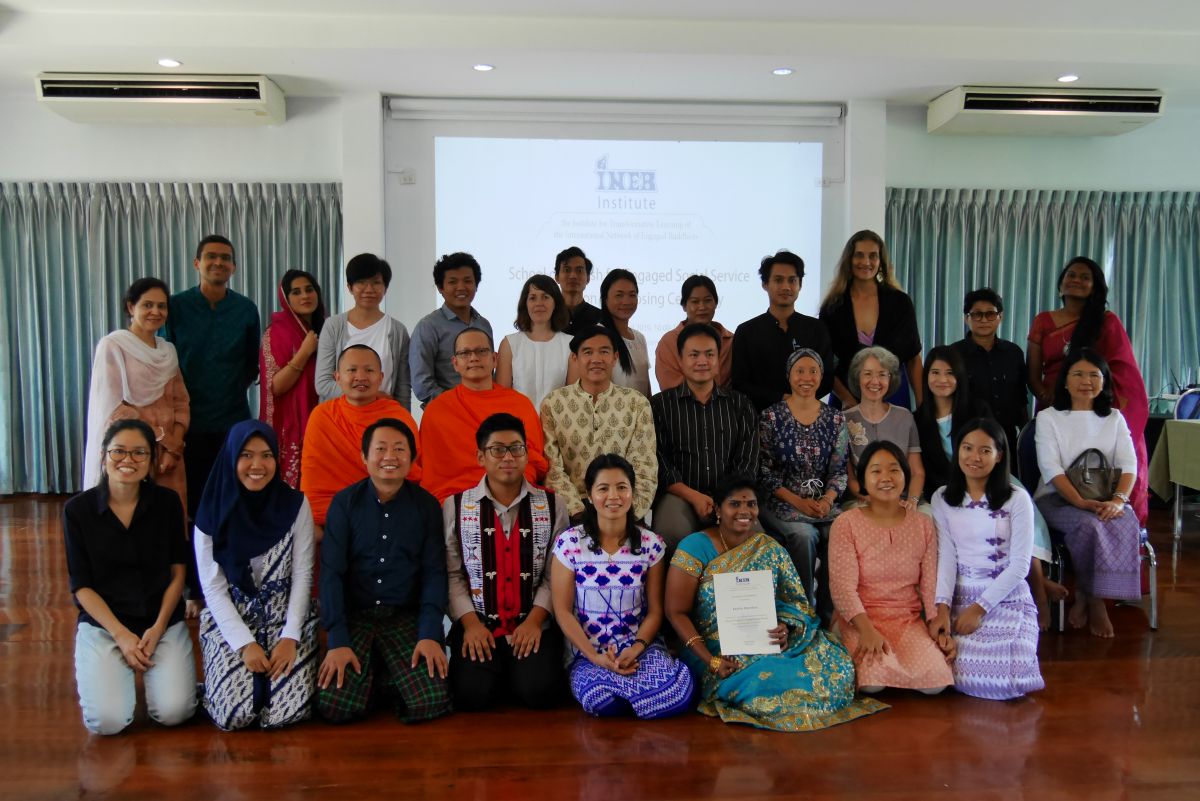
หลักสูตรนี้เหมาะสำหรับผู้ที่:
- มีความรู้ภาษาอังกฤษระดับปานกลางขึ้นไปและต้องการเพิ่มทักษะความชำนาญด้านภาษาอังกฤษอย่างก้าวกระโดดในระยะเวลาอันสั้น
- ต้องการฝึกใช้สมอง หัวใจ และทักษะต่างๆ ที่มีเพื่อพัฒนาตนเองและสังคม
- รักการเรียนรู้ โดยเฉพาะร่วมกับผู้อื่นที่มีความหลากหลายทางความเชื่อ วัฒนธรรม และความคิด
- มีความยืดหยุ่น ปรับตัวง่าย มีไฟและพลังในการใช้ชีวิต

ระยะเวลาเรียน: 12 มกราคม – 8 เมษายน 2563 (12 สัปดาห์)
สถานที่เรียน: อาศรมวงศ์สนิท คลอง 15 นครนายก
ค่าเล่าเรียน: USD6,000 (รวมค่าเล่าเรียน อุปกรณ์การเรียน ที่พัก อาหารและเบรคทุกมื้อ ค่าเดินทางทัศนศึกษาในประเทศ ประกันอุบัติเหตุ ตลอดระยะเวลา 3 เดือน)
ทุนการเรียนเต็ม USD6,000: สำหรับบุคคลสัญชาติไทย จำนวน 1 ทุน และพระสงฆ์ไทย จำนวน 1 ทุน
วิธีการสมัคร:
บุคคลทั่วไปและนักบวชที่สนใจส่งใบสมัครทางอีเมลได้ภายในวันที่ 10 ธันวาคม 2562 โดยสามารถดูรายละเอียดเพิ่มเติมและดาวน์โหลดใบสมัครได้ที่ https://inebinstitute.org/eng หรือสอบถามข้อมูลเพิ่มเติมได้ทางอีเมล info@inebinstitute.org และทางเฟสบุ้ค INEB Institute
—
ขอขอบคุณผู้สนับสนุนทุนการศึกษา
– สำหรับบุคคลสัญชาติไทย: Regional English Language Office (U.S. Embassy in Thailand) https://th.usembassy.gov/education-culture/regional-english-language-office/
– สำหรับพระสงฆ์ไทย: คุณแม่มาลี ตั้งสิน และคุณหมอพิชัย ตั้งสิน เจ้าของธุรกิจโรงแรม Ramada Plaza แม่น้ำริเวอร์ไซด์ https://www.ramadaplazamenamriverside.com/
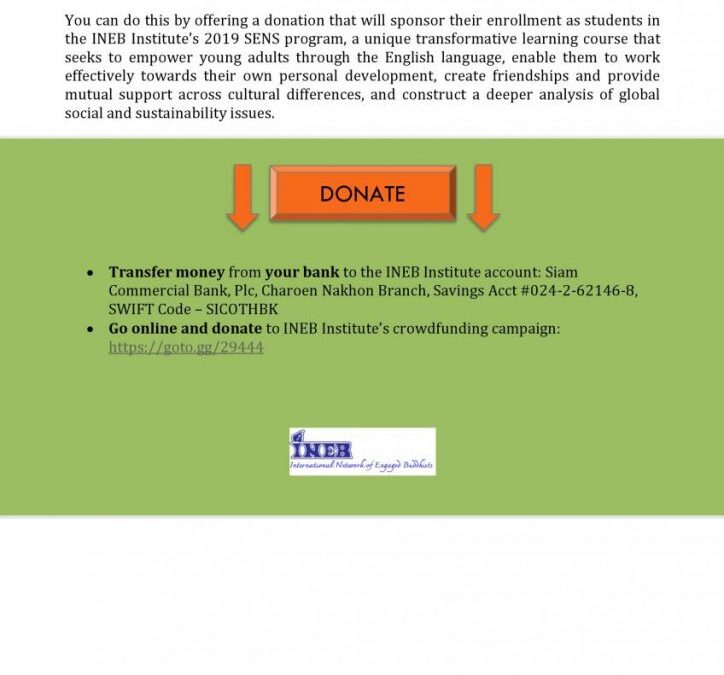
by topsi | Dec 24, 2018 | SENS
The INEB Institute’s three-month School of English for Engaged Social Service (SENS) cultivates the qualities necessary for self-knowledge and compassionate leadership at a time of growing crisis and uncertainty. The course helps students explore their relationships to emerging global crises—including climate change, social inequality, violence, and lack of voice—and their local manifestations. Through a study of the many signs of hope that are now emerging around the world, we help students to clarify their life direction, set goals, and design action plans. Our next program, running from January 6th to April 3rd, 2019, takes up the theme of Interfaith Understanding towards Peace and Sustainability.
Now in its fourth year, this transformative program has a reputation for developing students’ confidence in themselves, their use of English, and their leadership abilities to initiate social change. Many of our students come from marginalized communities across South and Southeast Asia with very limited access to resources. Seven such students have already been offered full or partial scholarships. The following students also have excellent qualifications and have been accepted into the program. Many of them need support to be able to join the program. Total program cost for each student is $6,000. (We have retained profiles of students who received full funding while this flyer was in progress to give a broader sense of our student cohort.)
Please consider making a donation via:
• Transfer money to the INEB Institute account: Siam Commercial Bank, Plc, Charoen Nakhon Branch, Savings Acct #024-2-62146-8, SWIFT Code – SICOTHBK
• Go online and donate to INEB Institute’s crowdfunding campaign: https://goto.gg/29444
• Go to INEB Network website and donate through INEB PayPal account: http://inebnetwork.org/donation/
Kindly let us know about your donation at info@inebinstitute.org and we can send you an official receipt.
With gratitude,
INEB Institute Team
Download Student Appeal in PDF – Click: SENS 2019 – Support Needed for Students Flyer – Final Please Share Widely
Download SENS program brochure – Click: SENS 2019 Brochure Final – Pls Share
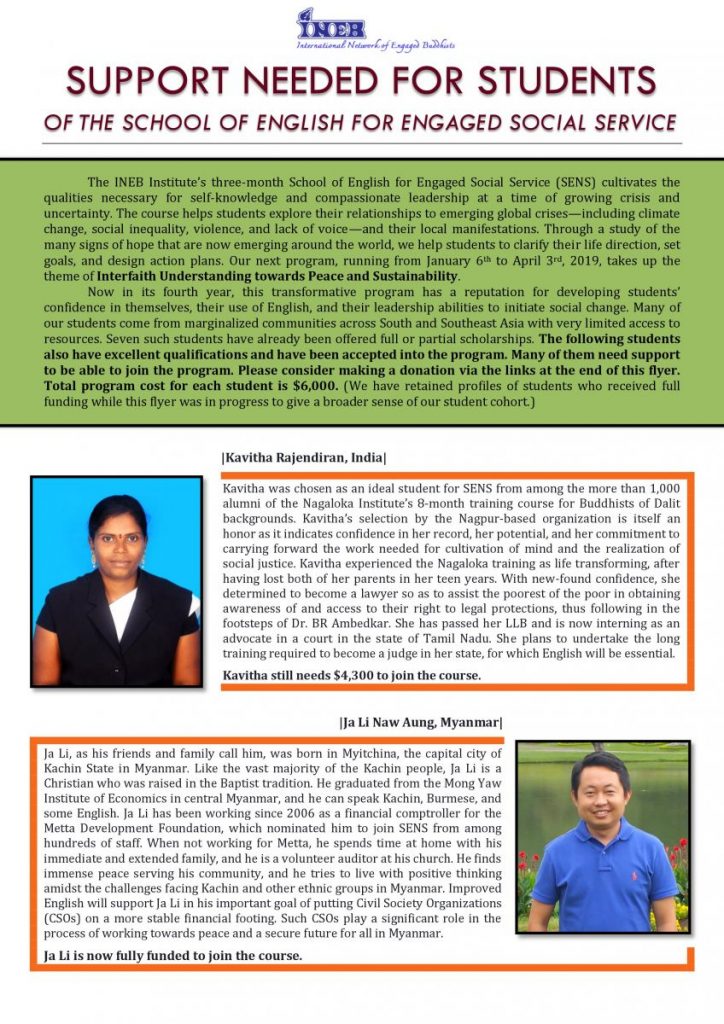
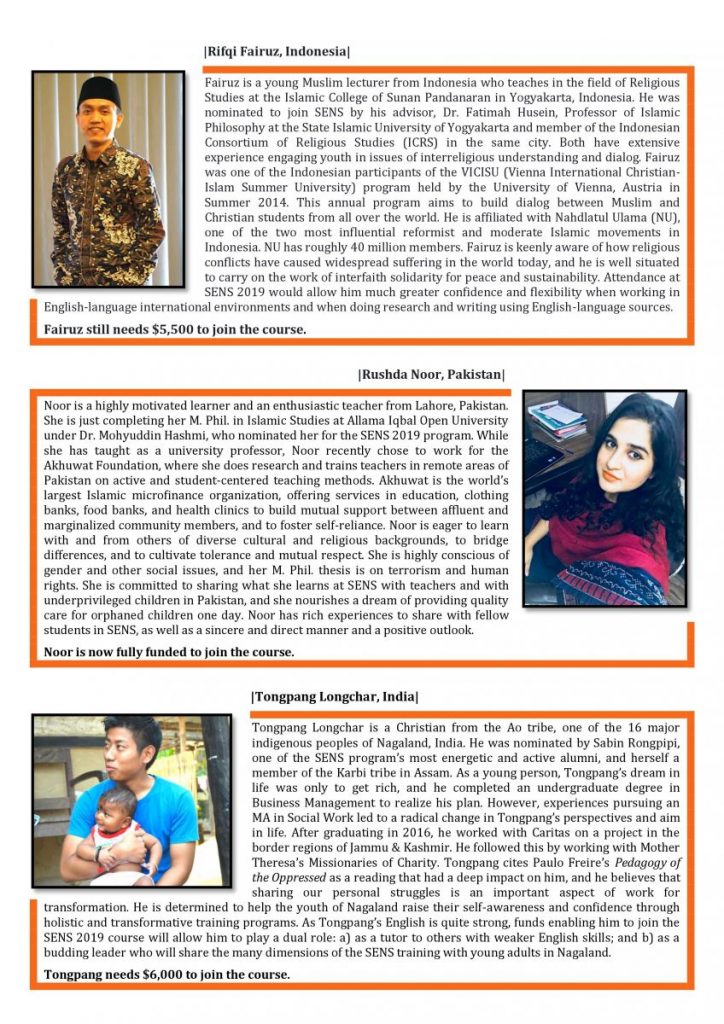
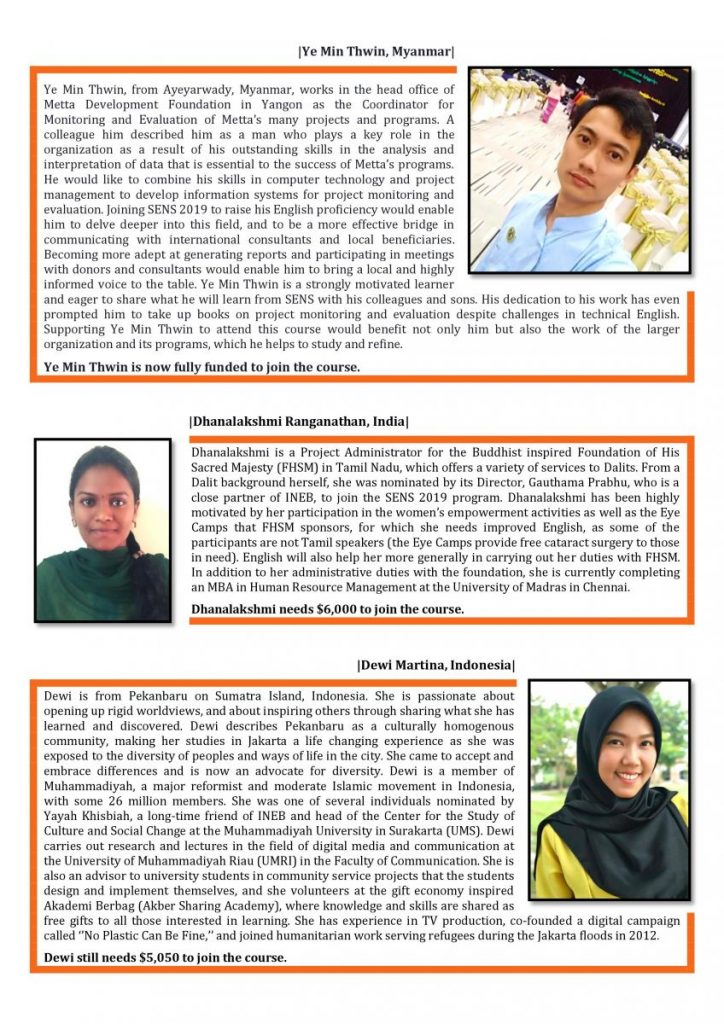
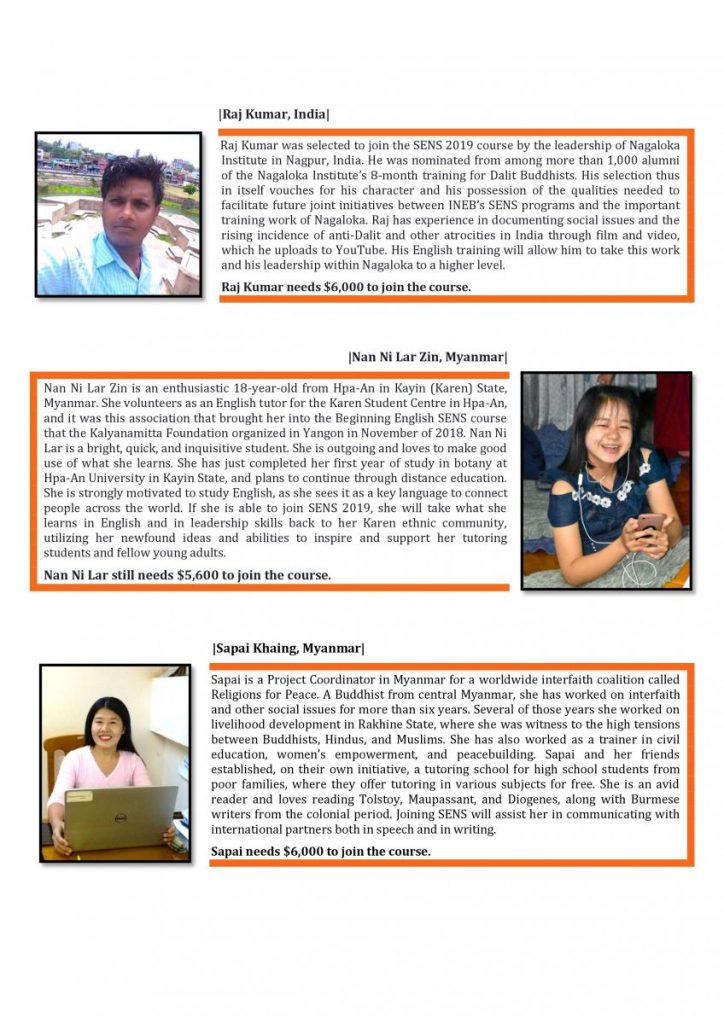
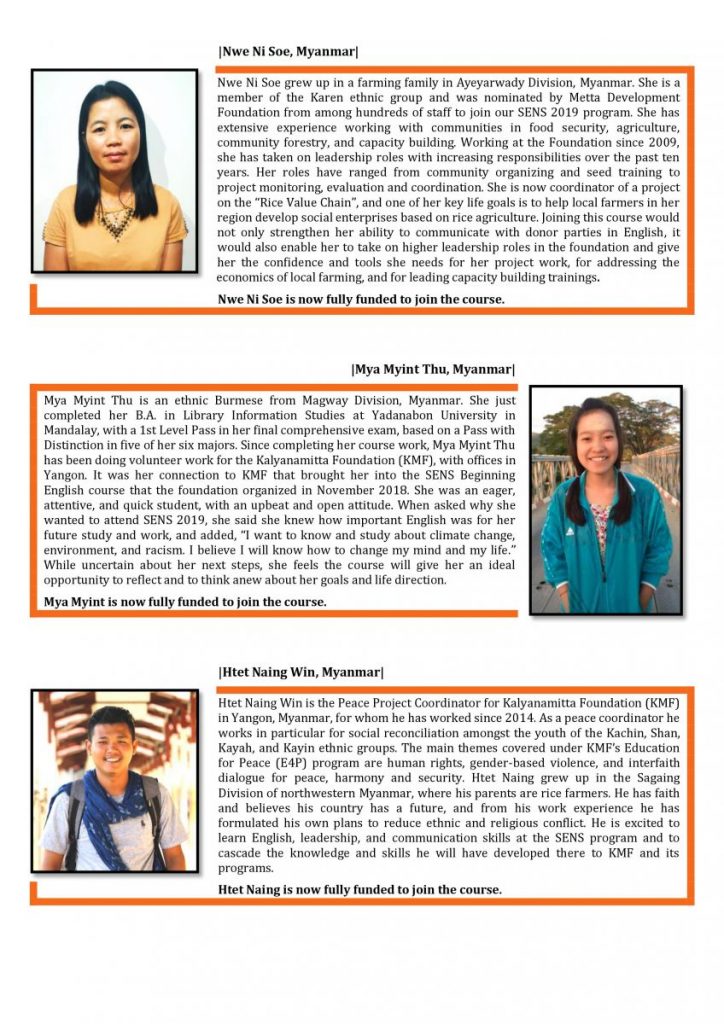
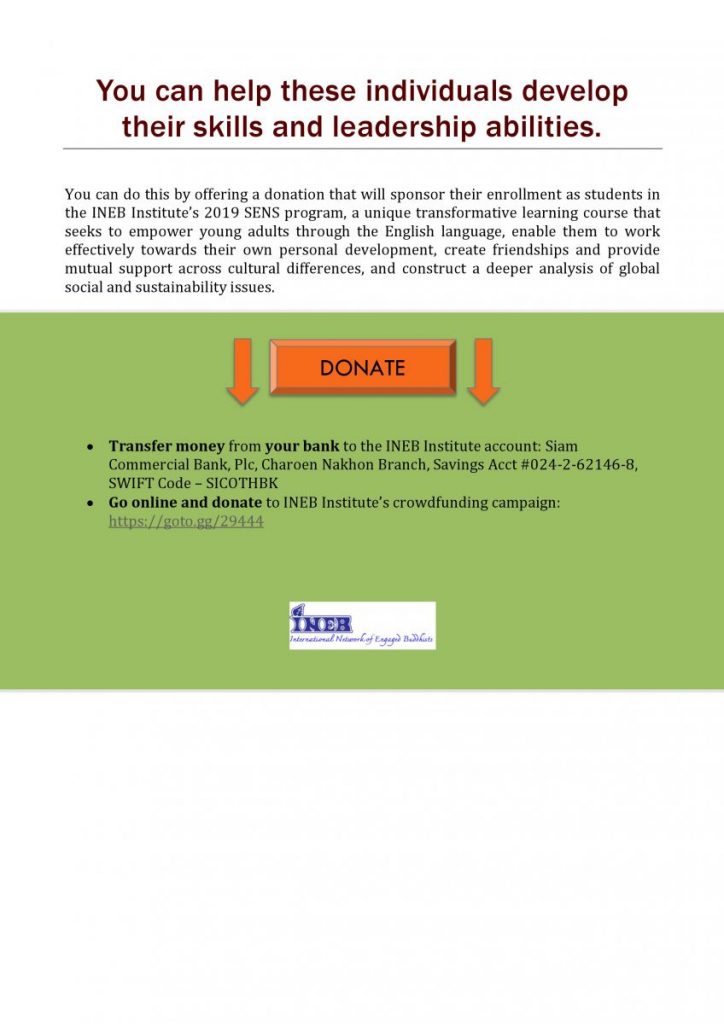

by topsi | Jun 26, 2018 | SENS

First Reflections on the School of English for Engaged Social Service 2018 Program—and Voices of Our Students
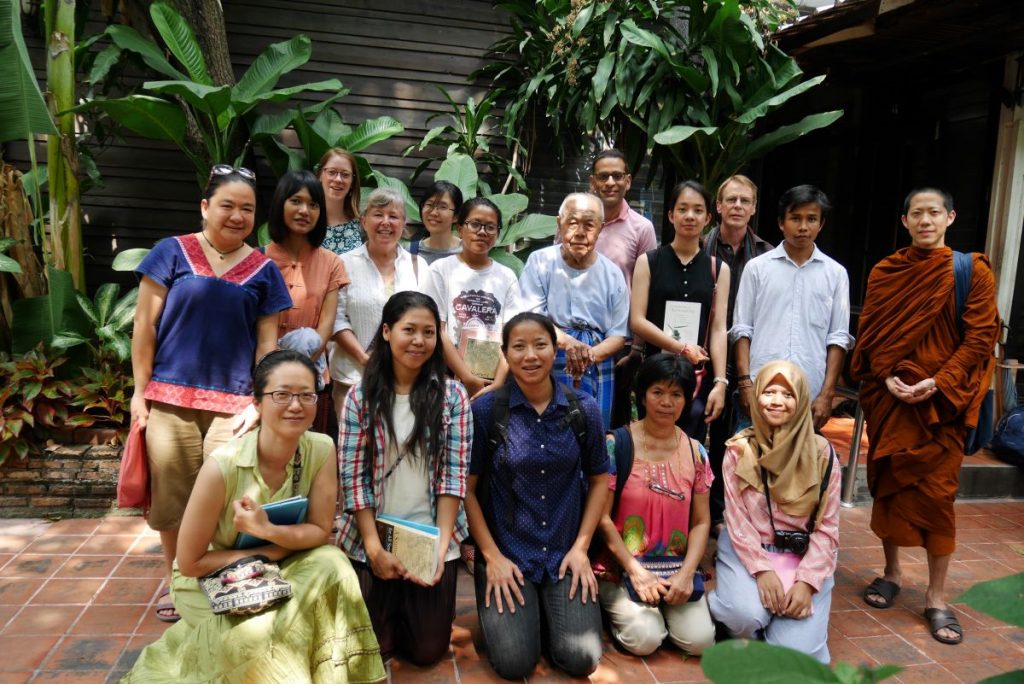
Students from SENS 2018 met Thai dissident Sulak Sivarkasa at his home in Bangkok January 27, 2018
The School of English for Engaged Social Service (SENS) is a place for learning English as a tool for leadership, self-cultivation, and social transformation. It is a three-month course that takes place annually from January to April at the Wongsanit Ashram near Bangkok.
How to Cultivate Leadership
It is very difficult to set a life direction or to lead others if you are doubtful or unsure of your own voice, of your own value, or of your own place in the world. Mindful and compassionate leadership is urgently needed in the world at this time, yet many of us are in fact doubtful.
In SENS we recognize that this doubt is widespread, for many reasons. It is a doubt that can be especially deep for women, for members of minority ethnic groups or oppressed nationalities, or for those who grew up in challenging circumstances. Yet we know on principle and from experience that every human being who receives the necessary support has the potential for profound leadership. What is that necessary support?
Five kinds of support we try to provide in the SENS program are:
1. Appreciation and Listening. We do everything we can to appreciate the beauty and goodness of each participant in the course, as they are when we first meet them, blemishes and all. We do this by appreciating them verbally, by soliciting their stories and opinions, and by listening to them with genuine respect and thoughtful attention. We de-emphasize critique, because everyone has been criticized and corrected so much that they become overly watchful of what they do, fearful that they won’t do something right… or worse, that they could never be right enough. We think our students, like all of us, need to be reminded of what is already right. Once they know we genuinely see their goodness and beauty, it is quite easy for them to accept suggestions, critiques, and corrections when needed.
2. Confidence. Secondly, we demonstrate our confidence in the students by assuming and stating that they all have the potential to be leaders in some social sphere or another. Our view is that all human beings can develop the qualities of genuine leaders, such as integrity, kindness, flexibility, and a willingness to think about the good of everyone. We begin by acknowledging the ways in which students already manifest these qualities to varying degrees. And we consistently affirm to the students that they can do things they may be afraid to try.
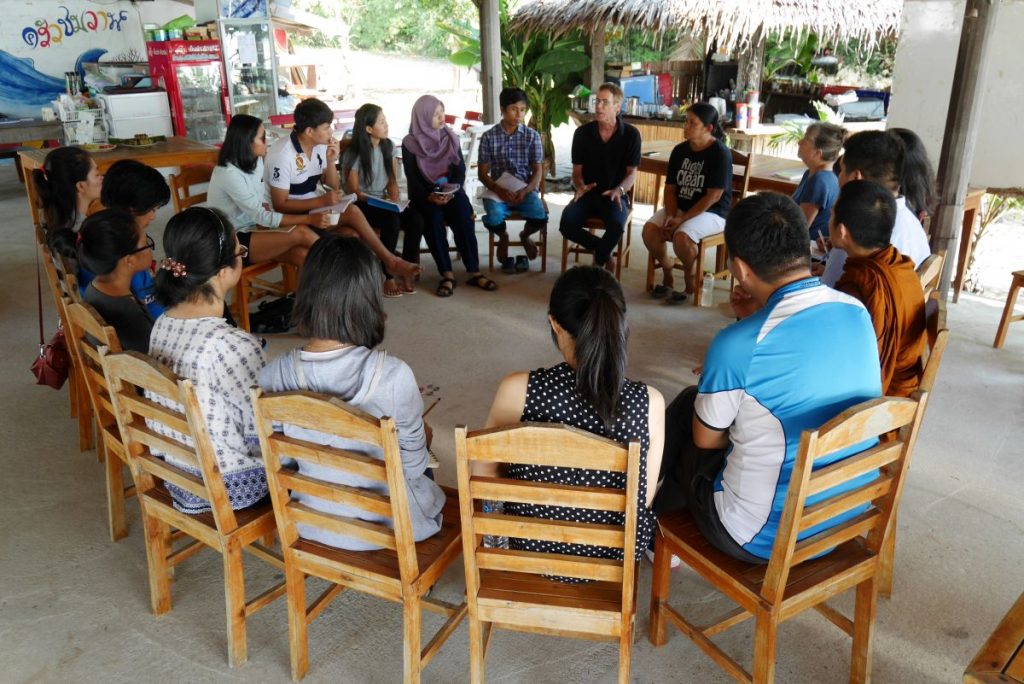
The SENS group meets with grassroots community leader Korn-Uma Pongnoi in Bo Nok, Thailand
3. Inspiration Towards Leadership. Our aim throughout the course is to provide alternative and approachable models of leadership that are based on peer relations and mutual respect, rather than on hierarchical relationships. In the work team we do our best to practice a kind of leadership that is strong in setting a tone and in doing what needs to be done for the success of our learning project, while also allowing ourselves to be vulnerable and accepting that we too will make mistakes. We take students on field trips to meet individuals who are outstanding leaders in one dimension or another, and students interact with them through interviews and discussions in a small group setting. In this way we support the students’ moral imaginations, for as they see the good that others have done, often against terrible odds, they begin to have a larger picture of what they too could do. Through workshops our students work closely for two or three-day periods with individuals who offer their skills in direct support of the students. Those experiences also clearly inspire the students to consider more deeply how they themselves could lead, train, or facilitate small groups. Finally, we ask the students to do research and give a presentation on a leader they would like to emulate.
4. Demonstrating the Need for Authentic Leaders. Our inspiration towards a new kind of leadership is strengthened by our exploration with the students of the major crises facing humanity at present. These crises include climate change, severe social inequality, the difficulty of realizing genuine democracy, and the use of violence as a method of attaining social or political goals. Students are further motivated to step up and take leadership when they see how dire the situation is, and the extent to which many established leaders ignore or downplay the seriousness of these threats.
5. Tracking the Growth of Each Participant. Finally, we make an effort to get to know each of the participants in the course well enough to know what kind of support each one specifically needs. We try to keep track of their personal growth throughout the course, so that they can overcome even very personal and subtle but persistent obstacles. In doing so we build on ancient forms of mentorship that require the teacher to be aware of the particular needs and difficulties of each student, and to take the time to devise a plan and to respond appropriately. In this way we challenge the impersonal and distant character of some forms of contemporary teaching. We also hope to model what we regard as a deeper form of solidarity in the teacher’s commitment to the student, and to make this kind of leadership seem normal, desirable, and attainable to the students.
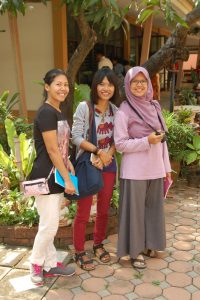
L to R, Thet Nwe Soe and Phoo Pwint (Myanmar), Annisa Hasanah (Indonesia)
Learning how to integrate these five kinds of support most effectively for each new group of participants is a process that is at the heart of what we do. It requires that we continue to fine-tune when we succeed and seek to understand and devise alternative strategies when outcomes are not what we had hoped for. We’re pleased to report that we have become consistently better at determining how to support both individual participants and the group as a whole, as they work to realize their vast human and leadership potentials.
As evidence of our successes, we include here some of the reflections and goals that students shared at the 2018 SENS graduation ceremony held on April 4, 2018, generously hosted by Dr. Pichai at his Maenam Resort Nakhon Chaisri. Students crafted their own statements, but they received help with English phrasing, and their final statements have been edited for clarity.
We offer a limited selection of students’ reflections here, but we hope to offer more of our students’ voices, and share more about what we learned this year, in upcoming reports. If you are inspired by what you read here, you may help in one of these ways: 1) by spreading the word about the SENS programs; 2) by donating to the SENS Scholarship Fund: https://inebinstitute.org/donation/; or 3) by sponsoring a student in one of our upcoming programs. Next year’s course runs from January 6 to April 3, 2019. Those who would like to apply can do so at https://inebinstitute.org/apply/
Excerpts from Statements by SENS 2018 Students:
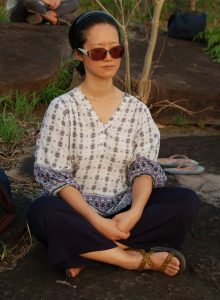
Sae Rob Lee (South Korea)
Sae Rob Lee – Jungto Society, South Korea
“For the benefit of all sentient beings.” In our Korean historical DNA, this commitment has been working deeply in our unconscious. …. My goal is to live by this teaching until I die. …. Thanks to this course, SENS, I’ve met engaged Buddhist practitioners, grassroots movement leaders, and learned about many social activities in Thailand. It is very hopeful that there are so many social changers—more than I expected. For a long time, I’ve concentrated on domestic social issues, but now I’ve changed. I want to work for more international or global issues. SENS gave me a chance to have a wider perspective and to be confident to communicate with international workers. We are not separated, but connected, so that we can cooperate in many ways. This is my great experience here.
A Student Who Wishes to Remain Anonymous
I see many new possibilities and learned a lot through this course. Through this program I have learned:
• To be an effective leader you need to be able to respond to challenges with intelligence, strategy, and sincerity.
• About the socialization and internalization of gender inequality through two wonderful women, Ouyporn and Ginger.
• How important it is to have Kalyanamitra in one’s life.
• When people have the same values, they naturally come together in unison in some ways.
• The importance of listening to what other people have to say.
• How climate change impacts everything and everyone’s life, and that even our civilization is at stake.
Thet Nwe Soe – Metta Development Foundation, Myanmar
As an adult, I haven’t shared my feelings with my parents that much. But learning counseling has encouraged me to share more with them and also to listen to them. …. Before this course, I didn’t have proper goals for my life. I just tried my best wherever I was or whatever I was doing. But now I see the value of identifying my goals and the steps I need to be able to reach them.

Students of SENS 2018. From L to R, Samkham Meunsy (Laos), Sabin Rongpipi (Assam, India), Thet Nwe Soe, (Myanmar)
Samkham Meunsy – Participatory Development Training Center (PADETC), Laos
I want to create a space in the countryside where youth can come to learn skills outside of school and access resources for personal development, including scholarships to study abroad, workshops and trainings, as well as community and network-building. These are not new ideas. But this course gave me the confidence I needed to move forward with them. Thank you to the SENS community and to all of our supporters for giving me the opportunity to learn more English.

Phoo Pwint gives her statement at the graduation ceremony.
Phoo Pwint – Kalyana Mitta Development Foundation, Myanmar
Previously, I stood for my Myanmar people; now I realize I need to stand for all living things. Because we have the same problems and we need to solve them all together. English language is a tool for social change. Therefore, it can be applied to connect to a global network. …. I decided to set up my goals for after this course as follows:
• To do regular practice for improving my English skills into advanced level in 2018.
• To listen deeply to my friends and community when they need someone to listen.
• To do research about the traditional environ-mental conservation customs and beliefs of ethnic groups and how to create an environ-mentally friendly culture in my country. I aim to complete this research within two years.
• To initiate an Eco Campus Movement at universities in my country that will go broader and deeper than it has before.
This is an expanded version of an article by Ted Mayer published in Seeds of Peace Vol. 34, No. 2 May-August, 2018
Download PDF First Reflections on the SENS 2018 Program and Voices of Students – Final Pls Share
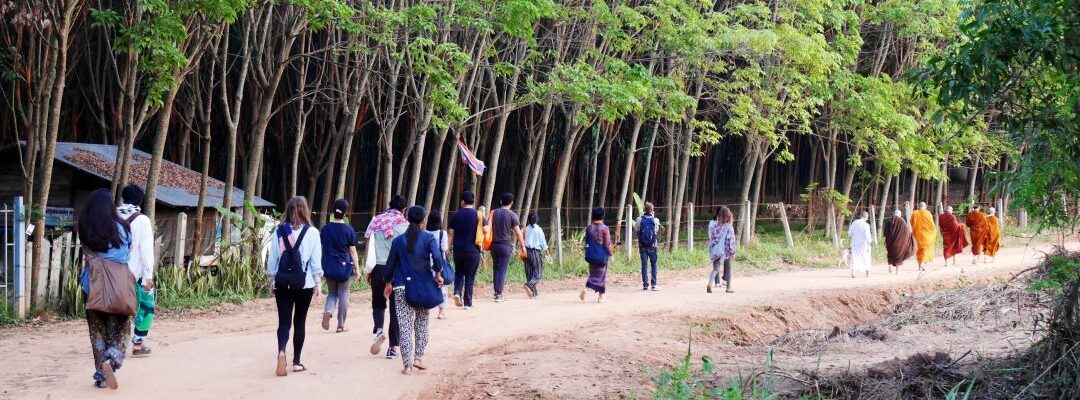
by topsi | May 4, 2018 | SENS

The School of English for Engaged Social Service (SENS) is a place for learning English as a tool for leadership, self-cultivation, and social transformation. It is a three-month course that takes place annually from January to April at the Wongsanit Ashram near Bangkok.
Leadership

It is very difficult to set a life direction or to lead others if you are doubtful or unsure of your own voice, of your own value, or of your own place in the world. Mindful and compassionate leadership is urgently needed in the world at this time, yet many of us are in fact doubtful.
In SENS we recognize that this doubt is widespread, for many reasons. It is a doubt that can be especially deep for women, for members of minority ethnic groups or oppressed nationalities, or for those who grew up in challenging circumstances. Yet we know on principle and from experience that every human being who receives the necessary support has the potential for profound leadership. What is that necessary support?
Two kinds of support we try to provide in the SENS program are:
- We do everything we can to appreciate the beauty and goodness of each participant in the course, as they are now, blemishes and all. We do this by appreciating them verbally, by soliciting their stories and opinions, and by listening to them with genuine respect and thoughtful attention. We de-emphasize critique, because everyone has been criticized and corrected so much that they become overly watchful of what they do, fearful that they won’t do something right… or worse, that they could never be right enough. We think our students, like all of us, need to be reminded of what is already right. Once they know we genuinely see their goodness and beauty, it is quite easy for them to accept suggestions, critiques, and corrections when needed.
- We also make an effort to get to know each of the participants in the course well enough to know what kind of support each one specifically needs. We try to keep track of their personal growth throughout the course, so that they can overcome even very personal and subtle but persistent obstacles.
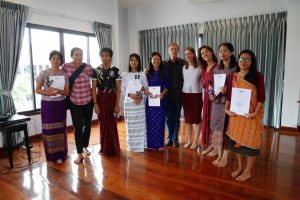 In trying to do these two things, we often fall short, and we sometimes fail completely, though that is rare. The important thing is that we also succeed. And we have become consistently better at learning how to support both individual participants and the group as a whole.
In trying to do these two things, we often fall short, and we sometimes fail completely, though that is rare. The important thing is that we also succeed. And we have become consistently better at learning how to support both individual participants and the group as a whole.
As evidence of those successes, we include here some of the reflections and goals that students shared at the 2018 SENS graduation ceremony held on April 4, 2018, generously hosted by Dr. Pichai at his Maenam Resort Nakhon Chaisri. Students crafted their own statements, but they received help with English phrasing, and their final statements have been edited for clarity.
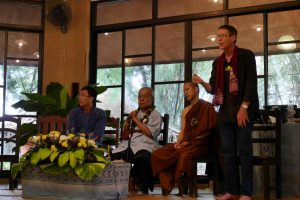 We are limited by space in this issue, but we hope to offer more of our students’ voices, and share more about what we learned this year, in upcoming issues. If you are inspired by what you read here, you may help in one of two ways: 1) by spreading the word about the SENS program; or 2) by donating to the SENS Scholarship Fund: https://inebinstitute.org/donation/.
We are limited by space in this issue, but we hope to offer more of our students’ voices, and share more about what we learned this year, in upcoming issues. If you are inspired by what you read here, you may help in one of two ways: 1) by spreading the word about the SENS program; or 2) by donating to the SENS Scholarship Fund: https://inebinstitute.org/donation/.
Next year’s course runs from January 6 to April 3, 2019.
You can find more information and apply at https://inebinstitute.org/eng/
Excerpts from Statements by SENS Students:
 “For the benefit of all sentient beings.” In our Korean historical DNA, this commitment has been working deeply in our unconscious. …. My goal is to live by this teaching until I die. …. Thanks to this course, SENS, I’ve met engaged Buddhist practitioners, grassroots movement leaders, and learned about many social activities in Thailand. It is very hopeful that there are so many social changers—more than I expected. For a long time, I’ve concentrated on domestic social issues, but now I’ve changed. I want to work for more international or global issues. SENS gave me a chance to have a wider perspective and to be confident to communicate with international workers. We are not separated, but connected, so that we can cooperate in many ways. This is my great experience here. Sae Rob Lee – Jungto Society, South Korea
“For the benefit of all sentient beings.” In our Korean historical DNA, this commitment has been working deeply in our unconscious. …. My goal is to live by this teaching until I die. …. Thanks to this course, SENS, I’ve met engaged Buddhist practitioners, grassroots movement leaders, and learned about many social activities in Thailand. It is very hopeful that there are so many social changers—more than I expected. For a long time, I’ve concentrated on domestic social issues, but now I’ve changed. I want to work for more international or global issues. SENS gave me a chance to have a wider perspective and to be confident to communicate with international workers. We are not separated, but connected, so that we can cooperate in many ways. This is my great experience here. Sae Rob Lee – Jungto Society, South Korea
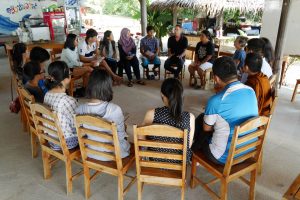
I see many new possibilities and learned a lot through this course. Through this program I have learned:
- To be an effective leader you need to be able to respond to challenges with intelligence, strategy, and sincerity.
- About the socialization and internalization of gender inequality through two wonderful women, Ouyporn and Ginger.
- How important it is to have Kalyanamitra in one’s life.
- When people have the same values, they naturally come together in unison in some ways.
- The importance of listening to what other people have to say.
- How climate change impacts everything and everyone’s life, and that even our civilization is at stake. This student has asked to not be identified.
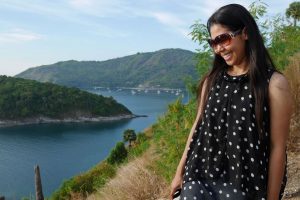 As an adult, I haven’t shared my feelings with my parents that much. But learning counseling has encouraged me to share more with them and also to listen to them. …. Before this course, I didn’t have proper goals for my life. I just tried my best wherever I was or whatever I was doing. But now I see the value of identifying my goals and the steps I need to be able to reach them. Thet Nwe Soe – Metta Development Foundation, Myanmar.
As an adult, I haven’t shared my feelings with my parents that much. But learning counseling has encouraged me to share more with them and also to listen to them. …. Before this course, I didn’t have proper goals for my life. I just tried my best wherever I was or whatever I was doing. But now I see the value of identifying my goals and the steps I need to be able to reach them. Thet Nwe Soe – Metta Development Foundation, Myanmar.
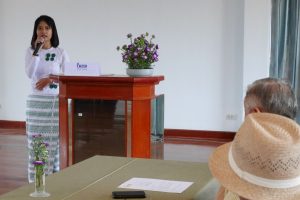 Previously, I stood for my Myanmar people; now I realize I need to stand for all living things. Because we have the same problems and we need to solve them all together. English language is a tool for social change. Therefore, it can be applied to connect to a global network. …. I decided to set up my goals for after this course as follows:
Previously, I stood for my Myanmar people; now I realize I need to stand for all living things. Because we have the same problems and we need to solve them all together. English language is a tool for social change. Therefore, it can be applied to connect to a global network. …. I decided to set up my goals for after this course as follows:
- To do regular practice for improving my English skills into advanced level in 2018.
- To listen deeply to my friends and community when they need someone to listen.
- To do research about the traditional environmental conservation customs and beliefs of ethnic groups and how to create an environmentally friendly culture in my country. I aim to complete this research within two years.
- To initiate an Eco Campus Movement at universities in my country that will go broader and deeper. Phoo Pwint – Kalyana Mitta Development Foundation, Myanmar.
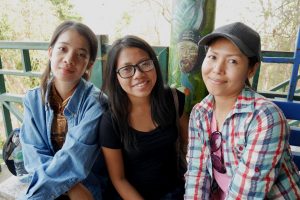 I want to create a space in the countryside where youth can come to learn skills outside of school and access resources for personal development, including scholarships to study abroad, workshops and trainings, as well as community and network-building. These are not new ideas. But this course gave me the confidence I needed to move forward with them. Thank you to the SENS community and to all of our supporters for giving me the opportunity to learn more English. Samkham Meunsy – PADETC, Laos.
I want to create a space in the countryside where youth can come to learn skills outside of school and access resources for personal development, including scholarships to study abroad, workshops and trainings, as well as community and network-building. These are not new ideas. But this course gave me the confidence I needed to move forward with them. Thank you to the SENS community and to all of our supporters for giving me the opportunity to learn more English. Samkham Meunsy – PADETC, Laos.
Ted Mayer

by topsi | May 4, 2018 | SENS

The School of English for Engaged Social Service (SENS) proudly takes its name from the School of Youth for Social Service, which Vietnamese monk Thich Nhat Hanh founded in 1964-65 to meet the crisis in the Vietnamese countryside created by war.
The School of English for Engaged Social Service was founded by Sulak Sivaraksa and others in 2015 to meet the crises of climate change, increasing social inequality, and individual confusion and despair about what to do. Its aim is to create a safe and supportive place for learning English as a tool for leadership, self-cultivation, and social transformation.
“Engaged” means that we learn to support each other with our mind, our senses, and our spirit fully present. It means that we work in service to society and all living beings from a place of openness and vulnerability, respecting the dignity and equality of those we encounter and assist, and ready to learn from them.
Our acronym, SENS, is a beautiful French word with many meanings. It is pronounced something like “saungs.” “Sens” in French means:
- “sense” as in the five senses. We rely on our experience, made possible through the senses, to test and to experience what is true, and to learn from experience what creates peace, clarity, and confidence.
- “instinct,” or to have an “intuitive sense” of things. Over time our mind builds up an intuitive sense of what to do, what to say, or how to behave. We can say, for example, a sense of humor, a critical sense, an aesthetic sense, or importantly, a moral sense. A moral sense helps us discern quickly what is important, what is going on, and how we can best respond.
- “judgment” or “reason” In French you can say “a mon sense,” which means “to my mind” or “in my opinion.” “Le bon sense” means “good sense” or “common sense.” We rely on reason and good judgment.
- “meaning.” We are always invariably interpreting the meaning of life and what goes on around us. Now it is important to understand the meaning of our time, and how it beckons us to respond.
- “direction” or “way.” Responding intelligently and boldly to the crises of the present requires that each of us set a personal direction that grows out of our genuine desire, love, and commitment. It also means that we agree on common goals and learn to cooperate and work together for a humane future for everyone.
Information about the SENS program in 2024: https://inebinstitute.org/eng/





















 In trying to do these two things, we often fall short, and we sometimes fail completely, though that is rare. The important thing is that we also succeed. And we have become consistently better at learning how to support both individual participants and the group as a whole.
In trying to do these two things, we often fall short, and we sometimes fail completely, though that is rare. The important thing is that we also succeed. And we have become consistently better at learning how to support both individual participants and the group as a whole. We are limited by space in this issue, but we hope to offer more of our students’ voices, and share more about what we learned this year, in upcoming issues. If you are inspired by what you read here, you may help in one of two ways: 1) by spreading the word about the SENS program; or 2) by donating to the SENS Scholarship Fund:
We are limited by space in this issue, but we hope to offer more of our students’ voices, and share more about what we learned this year, in upcoming issues. If you are inspired by what you read here, you may help in one of two ways: 1) by spreading the word about the SENS program; or 2) by donating to the SENS Scholarship Fund:  “For the benefit of all sentient beings.” In our Korean historical DNA, this commitment has been working deeply in our unconscious. …. My goal is to live by this teaching until I die. …. Thanks to this course, SENS, I’ve met engaged Buddhist practitioners, grassroots movement leaders, and learned about many social activities in Thailand. It is very hopeful that there are so many social changers—more than I expected. For a long time, I’ve concentrated on domestic social issues, but now I’ve changed. I want to work for more international or global issues. SENS gave me a chance to have a wider perspective and to be confident to communicate with international workers. We are not separated, but connected, so that we can cooperate in many ways. This is my great experience here. Sae Rob Lee – Jungto Society, South Korea
“For the benefit of all sentient beings.” In our Korean historical DNA, this commitment has been working deeply in our unconscious. …. My goal is to live by this teaching until I die. …. Thanks to this course, SENS, I’ve met engaged Buddhist practitioners, grassroots movement leaders, and learned about many social activities in Thailand. It is very hopeful that there are so many social changers—more than I expected. For a long time, I’ve concentrated on domestic social issues, but now I’ve changed. I want to work for more international or global issues. SENS gave me a chance to have a wider perspective and to be confident to communicate with international workers. We are not separated, but connected, so that we can cooperate in many ways. This is my great experience here. Sae Rob Lee – Jungto Society, South Korea
 As an adult, I haven’t shared my feelings with my parents that much. But learning counseling has encouraged me to share more with them and also to listen to them. …. Before this course, I didn’t have proper goals for my life. I just tried my best wherever I was or whatever I was doing. But now I see the value of identifying my goals and the steps I need to be able to reach them. Thet Nwe Soe – Metta Development Foundation, Myanmar.
As an adult, I haven’t shared my feelings with my parents that much. But learning counseling has encouraged me to share more with them and also to listen to them. …. Before this course, I didn’t have proper goals for my life. I just tried my best wherever I was or whatever I was doing. But now I see the value of identifying my goals and the steps I need to be able to reach them. Thet Nwe Soe – Metta Development Foundation, Myanmar. Previously, I stood for my Myanmar people; now I realize I need to stand for all living things. Because we have the same problems and we need to solve them all together. English language is a tool for social change. Therefore, it can be applied to connect to a global network. …. I decided to set up my goals for after this course as follows:
Previously, I stood for my Myanmar people; now I realize I need to stand for all living things. Because we have the same problems and we need to solve them all together. English language is a tool for social change. Therefore, it can be applied to connect to a global network. …. I decided to set up my goals for after this course as follows: I want to create a space in the countryside where youth can come to learn skills outside of school and access resources for personal development, including scholarships to study abroad, workshops and trainings, as well as community and network-building. These are not new ideas. But this course gave me the confidence I needed to move forward with them. Thank you to the SENS community and to all of our supporters for giving me the opportunity to learn more English. Samkham Meunsy – PADETC, Laos.
I want to create a space in the countryside where youth can come to learn skills outside of school and access resources for personal development, including scholarships to study abroad, workshops and trainings, as well as community and network-building. These are not new ideas. But this course gave me the confidence I needed to move forward with them. Thank you to the SENS community and to all of our supporters for giving me the opportunity to learn more English. Samkham Meunsy – PADETC, Laos.